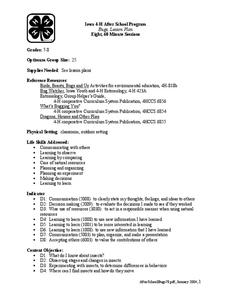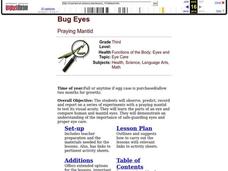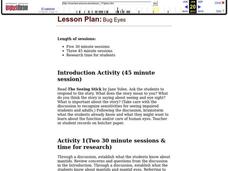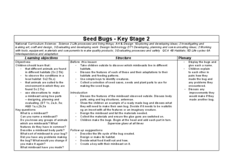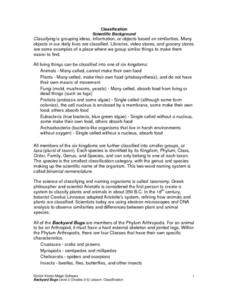Curated OER
Spider Safari
Today we are talking about one of the stealthiest, sneakiest, and most intriguing insects of all times, the spider. Learners will examine the predatory nature of these super bugs as they conduct a spider safari survey. Each child will...
Curated OER
Different Types Of Bugs
First graders create their own bug that contain the different characteristics that a bug can have. In this bugs lesson plan, 1st graders first list 3 - 5 characteristics before they create their bug.
Curated OER
Butterflies And Lady Bugs
Students engage in a variety of fun art activities about butterflies and lady bugs. Eric Carle's books are used as an opener for the lessons. They make t-shirts, sandwiches and a lady bug paper weight.
Curated OER
Caterpillars To Butterflies
Students observe the life cycle of a butterfly. They read butterfly/caterpillar themed books. They sequence the lifecycle from eggs on a leaf to an adult butterfly. They release their butterflies into a natural habitat after singing and...
Curated OER
Bug Hunt
Students strengthen observational skills by searching for insects in their home and classroom. In this observation lesson, students use magnifying glasses to classify what kinds of bugs were found. Students then create a bar graph to...
EnLiST
Trap Your Own Insects: What’s in Your Backyard?
Young entomologists construct three types of insect traps—pitfall, pollinator, and panel—before setting their traps out and observing what they caught. They then observe what types of insects the different traps attract.
Curated OER
Observing the Nutritional Relationships in an Ecosystem
Make learning about food webs fun and fascinating for your fifth graders.
Curated OER
Bugs
Young scholars participate in an after school program that promotes communications skills, hypothesizing, exploring, recording of data, leadership roles and making comparisons. They explore the world of insects, where they come from, how...
Curated OER
Bugs
Students participate in an after school program that promotes communicating with others, observing one's environment, how to take care of natural resources, making decisions and learning how to just have fun. They explore the world of...
Curated OER
Bug Eyes
Third graders observe, predict, record and report on a series of experiments with a praying mantid to test its visual acuity. They study the parts of an eye and compare human and mantid eyes.
Curated OER
What's Bugging You?
Students examine the effects of pests on other organisms, crops, and the environment. they construct an insect observation chamber and discover how some insects can be pests in some situations and beneficial in others. They write "pest...
Curated OER
Bug Eyes
Students explore mantid eyes and human eyes. In this mantid eyes and human eyes research lesson, students work in small groups to gather information. Students read books, observe mantids, and do experiments. Students then present their...
Curated OER
Beneficial Bug Scavenger Hunt
Students identify several beneficial insects and spiders, including predators and pollinators. They search an outdoor environment and record numbers and types of beneficial insects and spiders that they discover.
University of Kentucky
The Great Spider Debate
Poor, misunderstood spiders! They are feared, disrespected, and detested by many people, yet they do so many positive things. A great addition to any insect unit, learn about some of the more common spiders, while hopefully dispelling...
Curated OER
Feelin' Buggy
Students discuss five senses, compare and contrast human and insect senses, use adjectives to describe things they touch, smell, and see, and write stories in first person describing what it would be like to be size of insect.
Roald Dahl
James and the Giant Peach Lesson Plans
Immerse yourself in the world of giant bugs, rolling peaches, and brave little boys with an interdisciplinary unit on James and the Giant Peach. Young readers focus on the scientific themes of Roald Dahl's classic novel with bug hunts,...
John Lentine
Butterflies and Bugs
Symmetry, line, shape, art, and math are all connected through a fun hands-on craft. Included are instructions to a classic activity, where learners create butterflies to show symmetry in nature and then discuss symmetry in math. It is...
Curated OER
Seed Bugs; Stage 2
Students examine nature by participating in an environmental art activity. In this imaginary creature lesson, students discuss the importance of a habitat when pertaining to wild animals or bugs. Students utilize tree parts which they...
Cornell University
Let’s Raise Lacewings
Young entomologists explored beneficial insects and how they help control pests in the first lesson of the series. Now class members take a close look at the lacewing, which is a beneficial insect.
Curated OER
Strange Bugs
As individuals or in small groups, marine biologists research and discuss archaea and their unusual behavior as compared to bacteria. Teach them about the chemical makeup of the cell membrane of these strange organisms. This complex...
Curated OER
Backyard Bugs
Explore the concept of scientific classification and the similarities and differences between plant and animal species. Your class will participate in hands-on activities by investigating dichotomous keys and classifying their shoes. To...
Curated OER
Isopod Behavior, of the Rolly Polly Lab
Students investigate the behavior of isopods. In this isopod lesson plan, students make observations of an isopod and sketch the pillbug. They study the orientation of the isopods in relation to moisture in a chamber they construct from...
Curated OER
Plants 'n' Bugs
Second graders experiment to find if pollinators have color preferences. In this plant and bug instructional activity, 2nd graders gather information about how flowers pollinate. Students participate in a pollination experiment using...
Cornell University
Weed IPM
Go on a weed hunt! Scholars gain insight into the characteristics of plants and examine the outdoor environment in order to identify five different types of weeds. Learners then show what they know with a one-page reflection.










